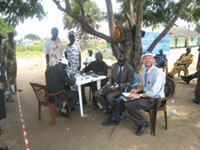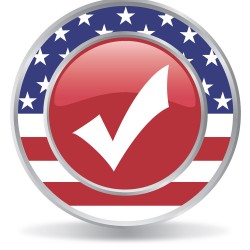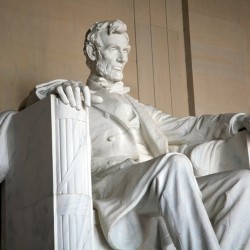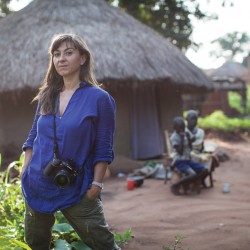Michael Eddy ’90: Assisting in the Birth of a Nation

Michael Eddy (right), at a voter registration center outside of Bor, Jonglei State, South Sudan, monitors preparations for a historic vote calling for independence for South Sudan. More than 150 human porters had to carry voting materials into some of the more remote polling sites. Photo courtesy of Michael Eddy.
In July 2010, when the region of South Sudan was a country waiting to be born, Michael Eddy ’90 arrived in the regional capital of Juba to head the USAID team charged with coordinating a referendum that would allow the people of South Sudan to decide if they wanted to form a new, independent nation.
“I sought out this position,” says Eddy, who previously oversaw development work for the U.S. government in Macedonia, Bolivia, and Nicaragua and is currently stationed in Thailand. “I was very much aware that this was going to be a historic period for South Sudan. In many ways, January 9, 2011, would be the equivalent for them of our July 4, 1776.”
The referendum date was set by a peace agreement between the north and south, brokered in part by the United States five years earlier. Years passed without progress in preparing for the polling process. Finally, a referendum commission was named, but it did not make its first decisions until mid-September 2010, compressing what would normally take about forty-two months into only four.
“By then, we were running out of time, with less than 120 days to January 9,” says Eddy, who used that time and a budget of $75 million to establish more than 2,600 polling centers and make it possible for 4 million people to register to vote.
The task was daunting. The Sudanese government in Khartoum had failed to develop the area of South Sudan, and there was no formal system of education, leaving some 85 percent of the people unable to read or write. Many had never voted in their lives. Materials they could understand had to be created and distributed during the rainy season in an area about the size of Texas — and with almost no paved roads.
“In addition to trucks and helicopters, more than 150 human porters had to physically carry the materials to some polling sites, taking as long as three days to hike in,” says Eddy. “We traveled by small planes, landing on grassy fields, and never knew what we would find there. One time there was a misunderstanding, and we flew into a remote airstrip that was not expecting our arrival. Our plane was surrounded, and we were held at gunpoint by the army until we could make it clear that we were there for election purposes.”
When election day came, more than 15,000 people had been trained, and the polling stations were in place. The people of South Sudan voted overwhelmingly for independence.
“Seeing people voting — it was so compelling,” Eddy says. “The Sudanese we were working with were so committed. It was something to see how emotional it was to them — especially the announcement of results. It was perhaps one of the most monitored electoral events in world history. The credibility of the exercise was never in any doubt. And in the end, the emotional relief was tremendous. People were breaking down in tears because they had given so much to make it happen. I doubt I’ll ever have an experience like that again.”
Published in the Winter 2011 issue



Comments
Michael Eddy August 8, 2013
The author did an excellent job on this account.